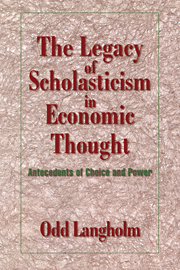Introduction
Published online by Cambridge University Press: 13 March 2010
Summary
This book is a study of the development of one particular subject in the history of Western economic thought. It is directly concerned only with that part of economic activity that has to do with the exchange of goods and services, including loans. If it touches upon production and distribution, it is merely indirectly and by implication. More specifically, the study deals with the will of economic actors making exchange decisions, that is, with the nature of economic choice. Because of scarcity, any economic actor's range of choice is restricted, in a social context, deliberately or not, by the choices made by other economic actors. We shall therefore be primarily occupied with what used to be called compulsion but is now more often referred to as economic coercion. The story starts in the Middle Ages with the scholastics, or “schoolmen.” I use these terms loosely to include both the university masters of theology and law and those who applied their ideas from the pulpit or in the confessional. On the subject in question, the scholastics taught the official doctrine of the Catholic Church, while drawing extensively on the heritage of classical antiquity. From this medieval origin, views on economic choice and compulsion/coercion will be recorded, as they gradually change over the centuries, until they manifest themselves in contemporary ideological and scholarly disputes.
There is one early-twentieth-century author who offers his readers a most revealing perspective on this subject. This is Max Weber. Because I am writing in English, I shall quote Weber's Wirtschaft und Gesellschaft in the English edition, Economy and Society.
- Type
- Chapter
- Information
- The Legacy of Scholasticism in Economic ThoughtAntecedents of Choice and Power, pp. 1 - 12Publisher: Cambridge University PressPrint publication year: 1998

